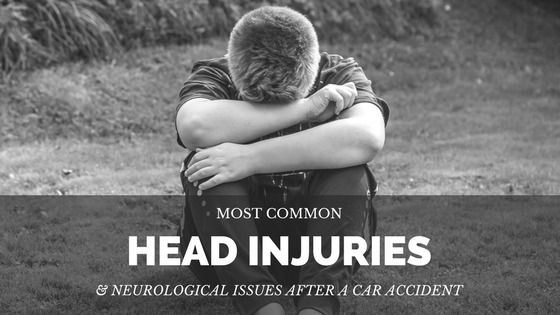Car accidents are the third leading cause of Traumatic Brain Injury (TBI) deaths in the United States. Brain injuries sustained in a car accident often go unnoticed by victims as symptoms may not appear for weeks. Failure to attend to a TBI may result in permanent brain damage and even death.

A common misconception of brain injuries is that one must hit their head or fall unconscious in order to be diagnosed with a TBI. However, brain injuries can occur from the impact of the collision alone. This impact causes your brain to hit the inside of the skull, leading to severe injuries that are not externally noticeable. Always remain alert to any possible symptoms of a TBI in the following days, and weeks, after an accident.
The severity of a Traumatic Brain Injury after a car accident ranges from mild (“a brief change in mental status or consciousness”) to severe (“an extended period of unconsciousness or memory loss after injury”). Regardless of the severity of your injury, seeking medical attention is vital to ensuring your health and safety.
Concussion
The most common TBI is a concussion. Most people can fully recover from a concussion with rest. Concussions can last anywhere from a few hours to a few weeks. The following is a list of common symptoms experienced by those with a concussion:
- Confusion
- Depression
- Dizziness and/or balance problems
- Double and/or fuzzy vision
- Feeling foggy and/or groggy
- Feeling sluggish and/or tired
- Headache
- Memory loss
- Nausea
- Sensitivity to light or noise
- Sleep disturbance
- Trouble concentrating/remembering
Post-Concussion Syndrome
Post-Concussion Syndrome is when concussion symptoms persist for weeks to months after the injury. If you suspect you have Post-Concussion Syndrome, arrange another visit with your doctor to discuss symptom management and further action. They may want to run a brain scan to ensure your injuries are not more severe.
Severe Brain Injuries
More severe injuries include blood clots in the brain, hemorrhaging (brain bleeds), and an edema (swelling of the brain). The following more serious symptoms warrant immediate medical attention:
- Headaches that become worse or that will not go away.
- Weakness, numbness or a decrease in coordination.
- Repeated nausea or vomiting.
- Slurred speech.
- Looking very drowsy and/or inability to wake up.
- One pupil is larger than the other.
- Having seizures and/or convulsions.
- Inability to recognize people or places.
- Becoming increasingly confused, restless, or agitated.
- Exhibiting unusual behavior.
- Loss of consciousness.
Symptoms of a TBI in Children
Children may experience the same symptoms of adults in both minor and severe Traumatic Brain Injuries. However, it can often be difficult to observe these symptoms in younger children. The following symptoms may be a sign of a TBI in your child:
- Crying more than usual.
- Headache that does not go away.
- Changes in the way they play or act.
- Changes in the way they nurse, eat and/or sleep.
- Being upset easily and/or having more temper tantrums.
- A sad mood.
- Lack of interest in usual activities and/or favorite toys.
- Loss of new skills, like toilet training.
- Loss of balance and trouble walking.
- Not being able to pay attention.
The same action taken for an adult when a TBI is suspected should be followed immediately for children.
As a good rule of thumb, when in doubt, don’t hesitate to see your doctor or call 911.
Call our law offices today at any of our convenient locations and get a free consultation.
Arlington (817) 522-4451
Denton (940) 222-4060
Dallas (972) 362-6848
Fort Worth (817) 764-1375
Cedar Hill (972) 338-9427
McKinney (469) 522-3688
Lewisville (972) 354-4605
You can also contact us online by using our quick contact form.










